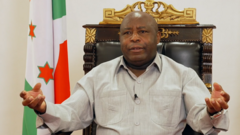In a recent BBC interview, Burundi's President Évariste Ndayishimiye expressed concerns over "credible intelligence" suggesting that Rwanda is plotting an attack on his country. He recalled a coup attempt orchestrated by Rwanda a decade ago, drawing parallels to current situations unfolding in the neighboring Democratic Republic of Congo (DRC). Despite Rwanda's rebuttal and claims of bilateral security cooperation, Ndayishimiye's allegations raise serious questions about regional security dynamics.
Rwanda Accused of Planning Attack on Burundi Amid Growing Tensions

Rwanda Accused of Planning Attack on Burundi Amid Growing Tensions
Burundi's President Ndayishimiye warns of a possible Rwandan attack, calling for dialogue and peace between the two nations.
Ndayishimiye emphasized that Burundians are determined to defend themselves, contrasting their stance to the suffering of Congolese citizens amid ongoing conflict. He insisted that while Burundi desires dialogue rather than war, they will respond if they are attacked and called for the respect of previously signed peace agreements between the two nations.
The context of these comments unfolds against a backdrop of escalating tensions along the Rwandan-Burundian border, compounded by the ongoing conflict spilling over from the DRC. Ndayishimiye highlighted that external forces, particularly in the DRC, are responsible for the persistent instability, motivated by the desire to exploit its resources. He reiterated the need for a united approach involving all parties, including opposition and armed groups, to foster lasting peace.
Despite the strained relations and allegations of proxy warfare from Rwanda, Ndayishimiye stated that Burundi's borders remain open for refugees seeking safety from DRC's turmoil. He asserted that while Burundi does not refuse refugees, it retains control over how they are accommodated.
For a comprehensive resolution to the violence and humanitarian crises plaguing the DRC, Ndayishimiye advocated for an expanded mandate for international forces to engage with rebel groups actively. He confirmed that Burundi's military presence in the DRC would persist until they can ensure the safety of their borders.
As regional leadership deliberates on the appropriate course of action, the situation remains volatile, with implications for not only Burundi and Rwanda but also the greater East African region.
The context of these comments unfolds against a backdrop of escalating tensions along the Rwandan-Burundian border, compounded by the ongoing conflict spilling over from the DRC. Ndayishimiye highlighted that external forces, particularly in the DRC, are responsible for the persistent instability, motivated by the desire to exploit its resources. He reiterated the need for a united approach involving all parties, including opposition and armed groups, to foster lasting peace.
Despite the strained relations and allegations of proxy warfare from Rwanda, Ndayishimiye stated that Burundi's borders remain open for refugees seeking safety from DRC's turmoil. He asserted that while Burundi does not refuse refugees, it retains control over how they are accommodated.
For a comprehensive resolution to the violence and humanitarian crises plaguing the DRC, Ndayishimiye advocated for an expanded mandate for international forces to engage with rebel groups actively. He confirmed that Burundi's military presence in the DRC would persist until they can ensure the safety of their borders.
As regional leadership deliberates on the appropriate course of action, the situation remains volatile, with implications for not only Burundi and Rwanda but also the greater East African region.






















